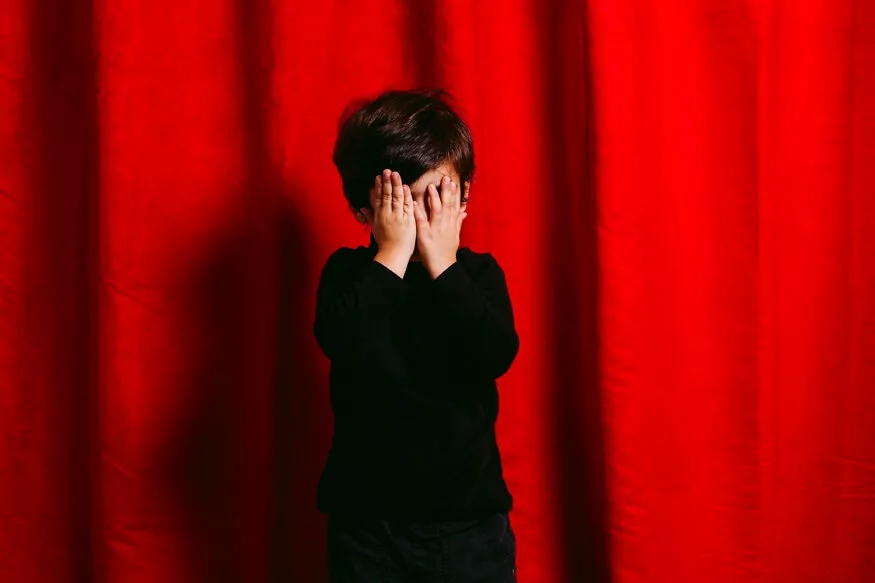What Is Stage Fright:
Stage fright, also known as anxiety about performance, is not just for adults. It can also affect children. Some kids struggle with the fear of performing in front of a crowd. It’s a school show, entertainment, or any other stage performance. In this blog, we will look at what is stage fright, what causes it, and how to help children overcome it.
Symptoms of Stage Fright:
1. Physical Signs:
Increased Heart Rate: Children experiencing stage fright may have a noticeably faster heartbeat. This physiological response is a common manifestation of anxiety.
Trembling or Shaky Hands and Legs, as a result of increased stress, and nervous energy can cause visible physical tremors, such as shaky hands or legs.
Sweating is a common symptom that is related to the body’s response to stress and anxiety. Anxiety can cause gastrointestinal distress, nausea, or stomach discomfort.
2. Behavioural Indicators:
- Avoidance of Public Speaking or Performances: A child may actively avoid situations that involve speaking in front of others or participating in performances to escape the source of anxiety.
- Clinginess or Seeking Reassurance: Children might seek constant reassurance from parents, teachers, or peers to alleviate their fears.
- Frequent Requests to Leave the Stage or Speaking Area: Expressing a strong desire to leave the stage or speaking area is a clear sign of discomfort and nervousness.
3. Emotional Cues:
- Intense Anxiety or Fear: Overwhelming anxiety and fear are at the core of stage fright. Children may express their apprehension verbally or through visible emotional distress.
- Tearfulness or Crying: The emotional strain of stage fright can lead to tears or visible emotional distress in children.
- Low Self-Esteem and Feelings of Inadequacy: Children experiencing stage fright may doubt their abilities and feel inadequate compared to their peers.
4. Communication Difficulties:
- Difficulty Speaking Clearly: Anxiety can affect a child’s ability to articulate words clearly, leading to stumbling over words or speaking in a shaky voice.
- Rapid Speech: Some children may speak rapidly when nervous, making it challenging for others to understand them.
5. Physical Freezing or Stiffness:
- Limited Movement or Expression: Children may exhibit physical stiffness or freezing on stage, limiting their movement and expression due to heightened self-consciousness.
6. Forgetfulness:
- Memory Lapses: Anxiety can impact memory retention, leading to forgetfulness or difficulty recalling lines, lyrics, or information during a performance.
7. Negative Self-Talk:
- Self-Critical Comments: Children experiencing stage fright may engage in negative self-talk, expressing self-critical thoughts about their abilities or potential for success.
Also Read: How to Improve Problem Solving Skills in a Student?
Causes of Stage Fright:
Let’s know some important Causes of Stage Fright for children. People should be aware of what Stage Fright is and what are the causes of Stage Fright to overcome fear and anxiety.
Fear of Judgment:
Before delving into causes, we should know what Stage Fright’s major issues are. The fear of being judged by others is a major issue of stage fright in children. Children may be thinking about how their classmates, teachers, or their parents will judge them. The anxiety comes from a need to meet expectations and also from a fear of criticism.
Lack of Confidence:
Children who lack confidence in their abilities are more susceptible to stage fright. This lack of belief in oneself can be influenced by past experiences of failure or receiving negative feedback. When children doubt their capabilities, the prospect of performing in front of others becomes a daunting challenge.
Social Anxiety:
Some children are naturally more introverted or shy, making social situations, especially those involving public performances, particularly challenging. The fear of being the center of attention can trigger social anxiety, contributing to stage fright.
Pressure from Authority Figures:
High expectations from parents, teachers, or other authority figures can create immense pressure on children. When the expectations exceed a child’s perceived abilities, the fear of not meeting these standards can lead to heightened anxiety. Excessive criticism or demands for perfection can exacerbate these feelings.
Perfectionism:
Children who strive for perfection in their performances are more likely to experience stage fright. The fear of making mistakes or not meeting their own exceptionally high standards creates intense anxiety. The pursuit of perfection can lead to a constant sense of pressure and self-doubt.
Comparisons with Peers:
Kids may experience stage fright when they compare themselves to their peers. The desire to measure up to the perceived abilities of others can create feelings of inadequacy and increase performance anxiety. Unhealthy competition or a competitive academic environment can contribute to this phenomenon.
Lack of Preparation:
Inadequate preparation for a performance can be a significant cause of stage fright. Children who feel unprepared or unsure of their material are more likely to experience anxiety. Proper rehearsal and preparation build confidence and reduce the fear of the unknown.
Negative Past Experiences:
Previous negative experiences, such as a poorly received performance or public embarrassment, can contribute to the development of stage fright. The memory of past failures can linger in a child’s mind, creating apprehension about future performances.
Also Read: Mental Health Tips for Your Child on “World Mental Health Day 2023”
Overcoming Stage Fright:
Here are some important points about how to overcome stage fright for children.
Gradual Exposure:
Start small and gradually expose children to performance situations. Begin with familiar and comfortable settings, like performing for family members or close friends. As they become more accustomed to the experience, gradually progress to larger audiences or more formal settings. This incremental approach helps build confidence and reduces the overwhelming nature of performing.
Positive Reinforcement:
Provide positive reinforcement to encourage children. Celebrate their efforts, regardless of the outcome. Emphasize the importance of the process and their willingness to face their fears. Positive reinforcement can boost their self-esteem and create a positive association with performance situations.
Teach Relaxation Techniques:
Introduce relaxation techniques to help children to overcome stage fright. Deep breathing exercises, visualisation, and mindfulness practices can be effective tools. Teach them to take slow, deep breaths before and during a performance to calm their nerves. These techniques provide a sense of control and help regulate physiological responses to stress.
Encourage Self-Expression:
Foster creativity and self-expression through various activities. When children are comfortable expressing themselves, they are more likely to feel at ease in performance settings. Encourage art, music, or drama activities that allow them to explore and showcase their talents in a supportive environment to overcome fear and anxiety.
Build a Supportive Environment:
Create a supportive and encouraging environment at home and in school. Knowing they have a support system can significantly alleviate the fear of judgment. Encourage open communication, where children feel comfortable expressing their concerns and receiving guidance. A supportive environment fosters a sense of security, making it easier for children to face their fears.
Professional Guidance:
Consider seeking professional guidance from a child psychologist or counselor. Professionals can help identify underlying issues contributing to stage fright and provide tailored strategies for overcoming these challenges.
Promote a Growth Mindset:
Teach children that challenges are opportunities for growth and improvement. Instilling a growth mindset helps shift the focus from fixed notions of ability to the belief in the capacity for development and learning.
Lead by Example:
Demonstrate a positive attitude toward challenges and setbacks to overcoming stage fright. Children often learn coping strategies by observing how adults handle stress and difficult situations. Be a role model for resilience, perseverance, and a healthy approach to overcoming fear and anxiety.
Create a Positive Narrative:
Help children reshape negative thoughts into positive ones to overcome stage fright. Instead of focusing on potential failures, encourage them to think about the excitement of sharing their talents and the positive aspects of the experience. Creating a positive narrative around performance situations can shift their mindset and reduce anxiety.
Also Read: Empowеring Sеnsitivity: Celebrating thе Strengths of Sеnsitivе Childrеn
Stage fright in kids is a common and manageable challenge with the right support and strategies. At EuroKids, we also believe that by understanding the symptoms and causes, parents and teachers can implement effective ways to help children overcome stage fright. Through gradual exposure, positive reinforcement, and creating a supportive environment, children can build confidence, develop resilience, and learn to embrace the experience of performing in front of an audience.










